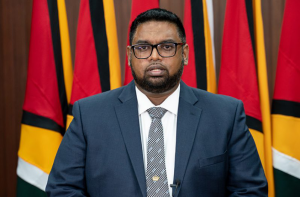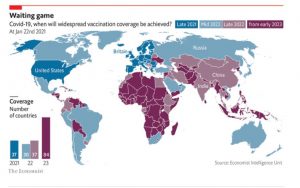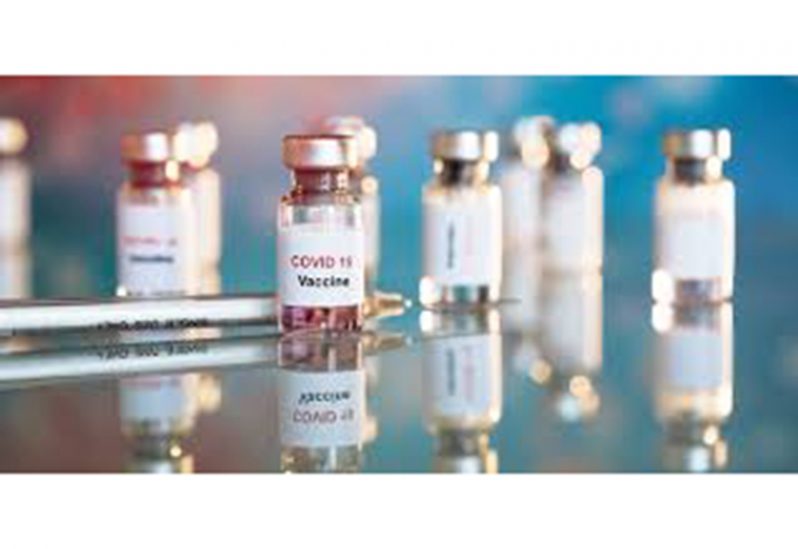– to add to govt’s ‘aggressive’ efforts to secure vaccines
By Vishani Ragobeer
CHINA has already agreed to donate 20,000 doses of its COVID-19 vaccines to Guyana, amid aggressive efforts by the government to engage its international partners so that enough vaccines can be secured to immunise the population in the shortest possible time, according to President Dr Irfaan Ali.

On Saturday, during an address to the nation, Dr Ali assured that the government is “aggressively” pursuing all avenues to secure vaccines. This includes engaging many of Guyana’s international partners, such as India, China and Russia, who have been developing and manufacturing vaccines.
Already, he highlighted, “The Government of China has confirmed that it will be donating 20,000 doses of vaccines to Guyana. Discussions are ongoing and arrangements to acquire vaccines from these countries will be finalised shortly.”
While it is unclear which Chinese vaccine Guyana will be receiving, international reports highlighted that Beijing-based biopharmaceutical company Sinovac has developed the CoronaVac, an inactivated vaccine which is able to expose the body’s immune system to the dreaded coronavirus without risking a serious disease response. This allows the body to become immunised by ‘fighting off’ the virus injected.
Meanwhile, Sinopharm, a Chinese state-owned company, is developing two COVID-19 vaccines, which, like Sinovac are also inactivated vaccines that work in a similar way and are reportedly 79 per cent effective.
Though this level of vaccine efficacy is lower than that of the Pfizer and Moderna vaccines, which have been used in the United States (US) and the United Kingdom (UK), the BBC reported that the United Arab Emirates (UAE), which approved a Sinopharm vaccine earlier this month, said the vaccine was 86 per cent effective. This greater efficacy rate was garnered from interim results of the UAE’s phase three trial.
President Ali also indicated that the government has been in talks with the Caribbean Community (CARICOM), the Organisation of Islamic Cooperation (OIC) and the European Union (EU) for a quota of vaccines. He further highlighted that the government is also engaging major vaccine manufacturers including Pfizer, BioNTec, Moderna and AstraZeneca to finalise a supply of vaccines from them. These governmental efforts to secure vaccines are conducted in addition to Guyana’s engagement with the COVAX facility, through which the country has already submitted the requisite documentation and is expecting vaccines as early as the month of February.
Months ago, Guyana signed up with the COVAX facility, a global initiative geared at accelerating the development and manufacture of the COVID-19 vaccines, and then providing them in a guaranteed rapid, fair and equitable manner. And, under this mechanism, Guyana is expected to receive its first set of vaccines to cover about 20 per cent of the population for free.
The first three per cent will be used for the frontline health workers and the next tranche, about 17 per cent, will be used for older persons and persons with higher risks, such as those with comorbidities. Guyana is not yet aware which of the vaccines it will receive.
‘SPEEDY COVERAGE’

Director-General of the World Health Organisation (WHO), Tedros Adhanom Ghebreyesus, recently lamented the unequal and inequitable distribution of COVID-19 vaccines. Subsequently, the Economist reported that advanced global economies will achieve widespread vaccination coverage exponentially faster than 84 poorer countries, which are projected to achieve that widespread coverage only until 2023. Guyana was listed as one of those 84 countries.
But, President Ali posited that his government wants to accelerate the rate of securing and distributing vaccines.
“We are pursuing all avenues to get as much vaccines to cover the population as quickly as possible,” he emphasised, explaining that the government is deploying enough of its human and financial resources to ensure this. Similarly, Minister of Health, Dr Frank Anthony, assured that efforts are underway to accelerate the procurement and distribution of vaccines. This, he reasoned, is why Guyana has been engaging other partners, aside from the COVAX facility, to secure those vaccines.
He also reminded that widespread vaccination is the “exit strategy” for the pandemic; this means that only when about 80 per cent of the population is immunised through vaccination or through recovering after contracting the virus, would there be some sort of ‘normalcy’.
To cater for the deployment of vaccines, Guyana’s vaccination capacity has been bolstered. Since Guyana is not yet sure which of the COVID-19 vaccines it will receive, the country has secured the necessary cold chain infrastructure to ensure that it is equipped to store the vaccines at temperatures that are cold enough.
Additionally, healthcare workers are being trained to administer the vaccines to adults, since a majority of Guyana’s vaccination regime deals with immunising children. Also, since COVID-19 vaccines require two doses over a period of time, copious record-keeping must be done. Health workers must also be trained to spot and treat potential side-effects of the vaccine, though these are not common.
Importantly, Dr. Anthony highlighted that the local health authorities should have the capacity to administer about 7,000 vaccines per day once the rollout process begins. President Ali, on Saturday, noted that some 3,800 vaccines will be available by February and March.
As the government prepares to immunise the population against the novel coronavirus, President Ali emphasised that public acceptance of the vaccine is necessary. While noting that getting vaccinated is not mandatory, he assured that the government would only distribute vaccines that have been deemed safe by the WHO, and those he himself will be vaccinated to show that the vaccine is indeed safe. He also assured that both doses of the vaccine will be made available to the population.



.jpg)









